Friday 13th has been regarded with superstitious dread for many years, so it is perhaps appropriate that Friday 13thJuly 2018 marked the end of the Rudolf Steiner School Kings Langley. Barring unforeseen developments, the school has now closed its doors for the last time after falling foul of Ofsted, and the future of its historic site and the present school buildings are currently uncertain. As a result of the closure, parents and pupils are having to search around for any new schools that still have room to take them, and the teaching and administrative staff will be scrambling to find new jobs after being made redundant.
I worked at the school for a number of years up until 2014 and my daughter received a good education there, so naturally I am sad that the school has come to such a sorry pass. I will have more to write about all of this in a future post but first I would like to give some idea of how the school came to be founded, together with an appreciation of the rich heritage that is now being so carelessly destroyed.
The school sits on the site of the 13thcentury royal palace of Kings Langley, built by Queen Eleanor, the wife of King Edward I, between 1279 and 1281. The king and queen had a great interest in the work of the Dominicans, and they may even have met the Dominicans’ most prominent teacher, Thomas Aquinas, during their travels in the Mediterranean, where they had been four years on crusade.

Edward II receiving the crown of England. (Image from a contemporary manuscript, copyright of the British Library Board)
Their son, Edward (who became Edward II in 1307), inherited the lands and the palace in 1302, and he established a Dominican friary there in 1308. Edward had grown up at Kings Langley and it was one of his favourite places. He was often under the influence of his court favourite, Piers Gaveston, and they may have been lovers; whatever the reason, his reign was considered to be disastrous for England and he was eventually deposed in 1327 by his wife, Queen Isabella and her lover Roger Mortimer. Before this, in 1312, an assembly of barons had hunted down and killed Piers Gaveston, to the king’s great distress. Gaveston had been excommunicated and so a proper burial for his beheaded body could not be arranged until the king had arranged a papal absolution for his favourite. This happened in 1315 and Gaveston’s body and head were brought to be buried in an elaborate ceremony in the Friary at Kings Langley.
Other kings and queens of England also lived at the palace: Edward III, who used Kings Langley as his seat of government during the Black Death in 1349; his fourth son, Edmund of Langley, the first Duke of York and the founder of the White Rose faction in the Wars of the Roses, has his tomb in the parish church; King Richard II held court and issued proclamations from the palace, and his court spent Christmas at Langley. The palace at Kings Langley is mentioned in Shakespeare’s Richard II. Richard was assassinated in 1400 and his throne was seized by the man who became Henry IV. After Richard’s death, Kings Langley went out of favour as a royal palace, although Henry V spent some time there in 1414. In 1431 there was a disastrous fire that caused extensive damage, after which no kings or queens lived there. The Friary church, which was consecrated in 1312 and could hold up to one hundred friars, survived until the 1500s when Henry VIII dissolved the monasteries and seized their assets for himself. In 1631, Charles I sold off the palace and priory to pay off debts owed to the City of London. This ended three centuries of royal association with Kings Langley.
Today there are no visible traces of the palace and only one building that remains from the Friary, which is nowadays somewhat confusingly called the Priory. This royal and religious history was as much as I knew about the site, until one day I was visited in my office by the school’s excellent librarian, Daniel Bryan. Daniel told me that he had been walking in the churchyard of Kings Langley Parish Church and had come across an unusual and interesting grave, with a bench besides it that was obviously connected with the grave. The grave was in a poor state and had been vandalised and was covered with litter and rubbish, but there was something about it that made Daniel want to clear it and investigate further.
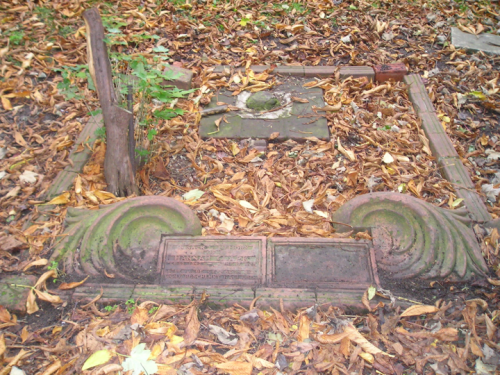
The remains of the grave of Hannah Clark in the cemetery of Kings Langley Parish Church.
This grave turned out to be the burial place of Hannah Clark (1845 -1935), one of the two founders of the first school on the site of the palace and friary. I decided to do some further research into more recent history and discovered that Hannah Clark was a pioneering teacher who had started a co-educational boarding school – this must have been a daring concept in Victorian times. Sometime in the 1890s, she was joined by another teacher, Margaret Cross (1866 – 1962), who had been educated at the University of Cambridge but, being a woman, was not allowed to graduate. (Although women entered Cambridge lecture halls slightly earlier than those at Oxford, Oxford was the first of the two to admit women to degrees and full status in 1921 and, astonishingly, it would be another 26 years before Cambridge followed suit in 1947.)
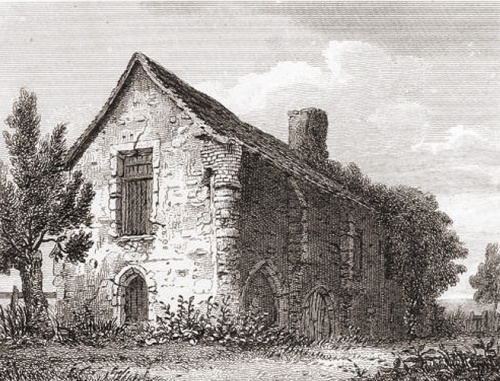
The ruins of the Priory at Kings Langley in an engraving from 1816. It can’t have looked much better in 1909 when Miss Cross and Miss Clark decided that this was where they would build their new school.
By 1899 Hannah Clark was running a school in Coombe Hill House, East Grinstead, Sussex. In 1909 Miss Clark and Miss Cross had found another site for their school, the ruins of the Priory at Kings Langley in Hertfordshire, which was being used as a farm outbuilding. They engaged the leading arts and crafts architects of the day, Parker & Unwin (also responsible for Letchworth Garden City) and got them to restore and extend the Priory and outbuildings so as to provide a home for the school, which was soon to be renamed The Priory School. The school opened in 1910 and the 1911 census records Miss Cross and Miss Clark as joint principals, living there with the 80-year old Norman Cross, Margaret’s father. At that time there were sixteen pupils, three servants and two assistant teachers.

A photo of unknown date, believed to be of Hannah Clark.
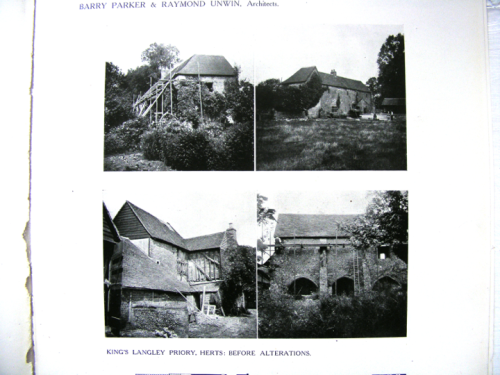
The ruins of the Priory, before Parker & Unwin began their work.
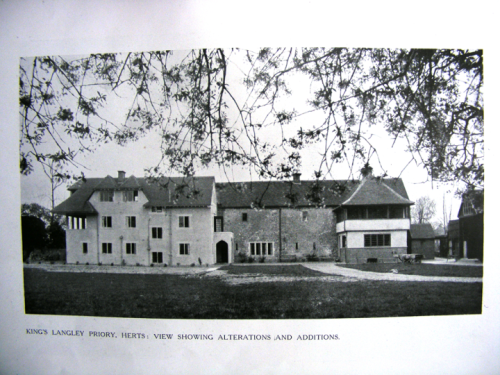
The Priory transformed by Parker & Unwin, with the addition of two wings to the older building – a most attractive and sympathetic piece of architecture in the arts and crafts style.
Miss Clark and Miss Cross were advanced educationalists and decided to run their new school on Montessori lines. In around 1920, the two women became interested in Rudolf Steiner’s new Waldorf school in Stuttgart, and in December 1921 Miss Cross was invited to join the New Ideals in Education committee on a visit to a course given by Rudolf Steiner at Dornach. The trip was organised by Millicent Mackenzie, who was a professor of education at University College of South Wales and Monmouthshire, the first female professor in Wales and the first appointed to a fully chartered university in the United Kingdom. She wrote on the philosophy of education, founded the Cardiff Suffragette branch, became the only woman Parliamentary Candidate in Wales for 1918, and was a key initiator of Steiner Waldorf education in the United Kingdom.

Professor Millicent Mackenzie in 1915.
Millicent Mackenzie, who had first met Steiner in August 1921, arranged for him and some of the Waldorf teachers to give a lecture cycle and supporting programme for British teachers to take place at the Goetheanum at Christmas 1921. Around forty people responded to her invitation, travelling from England to Dornach, where Rudolf Steiner held the lecture cycle Soul Economy – Body, Soul and Spirit in Waldorf Education in the White Room of the newly-built Goetheanum, that same room in which the disastrous fire was to break out just a year later.
Miss Cross knew not only Latin and Greek but was also fluent in German, so my assumption is that this is why she, rather than Hannah Clark, went to Switzerland to take part in the course. According to Helen Fox, who also attended the lecture cycle, “it was on the occasion of this Dornach course that Miss Cross, headmistress of a boarding-school at Kings Langley, offered her school to Dr Steiner, to be remodelled on anthroposophical lines.”
According to another attendee, Alexander Strakosch: “From talking with English listeners it was especially interesting to hear how little state officials in England interfere in the essentials of education and teaching. They have there a whole lot of non-state schools, and anyone who just wants to put pedagogical ideas into practice or to live out of good ideas will not have numerous difficulties put before them. At first many of these English teachers therefore had little understanding for the concept of free spiritual life. They thought (…) that in their country they already had it, for they could do what they liked. To grasp the concept of free spiritual life was hard for them.” How very ironic such a statement will seem to Steiner school teachers today…
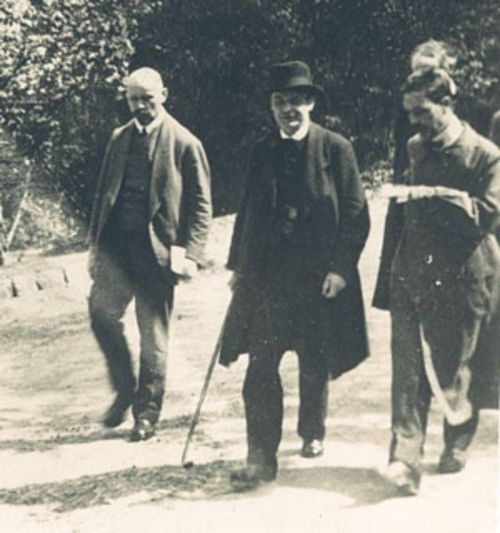
Rudolf Steiner circa 1922
On her return to Britain after the lecture cycle, Millicent Mackenzie then initiated a conference on the themes of Shakespeare, drama and education in Stratford-on-Avon in April 1922,to which she invited Rudolf Steiner. Miss Cross invited Steiner to visit the Priory School on his way to this conference and thus it was that on Sunday April 16th 1922 the school at Kings Langley became the only school in the UK ever to have been visited by Rudolf Steiner. Steiner himself gave an account of this visit when he got back to Dornach:
“I and other friends took up an invitation from Miss Cross, who showed us over her school at Kings Langley. (…) We could see how a number of children are brought up and educated in a boarding school of this kind. It is extremely interesting how children are (…) brought into proximity with life out of certain ideals of the present. The roughly forty to forty-five children in the boarding-school have to do everything; there are actually no servants there. The children have to get up early and care for the whole institution themselves, as well as cleaning their own shoes and clothes. They have to make sure there are enough eggs through breeding poultry, which they also do, and various other things you will be able to think of. They clean everything themselves, cook everything themselves and look after the garden. They have themselves first grown, harvested and cooked the vegetables which come onto the table, and then also eat them. A child is thus led into life in a many-sided way and learns a whole mass of things.
During the Christmas course Miss Cross formed an intention to organise this boarding-school in the manner of a Waldorf school. This is being considered as a quite serious plan. Mrs Mackenzie, who was also one of the chief moving forces for my being invited to the Shakespeare festival, is very much in favour of our school movement, supported by anthroposophy, winning a certain terrain in England. There is now an endeavour to form a committee for organising this school from an anthroposophical background, according to our education.
This will be a very significant and important step forward. If so energetic a will stands behind it as exists in the personalities of Miss Cross and Professor Mrs Mackenzie, it can be taken for granted that after various hindrances are overcome, something of the kind will be able to come about.”

The Priory School, showing the additional wings by Parker & Unwin on each side of the remains of the old Priory building. This is how the school would have appeared to Rudolf Steiner during his visit on Sunday 16th April 1922.
Millicent Mackenzie and Arnold Freeman (warden of the Sheffield Educational Settlement) then joined together to bring awareness of Rudolf Steiner’s educational ideas into English teachers’ organisations and arranged a further conference in August 1922 at Manchester College, Oxford on “Spiritual Values in Education and Social Life”. Millicent Mackenzie also organised a public lecture by Rudolf Steiner on education on 30 August 1924 in Essex Hall, London, under the auspices of the Educational Union for the Realisation of Spiritual Values and she gave the welcoming address. Through her efforts the founders of Steiner Waldorf education in the United Kingdom were introduced to these ideas and built up the first schools.
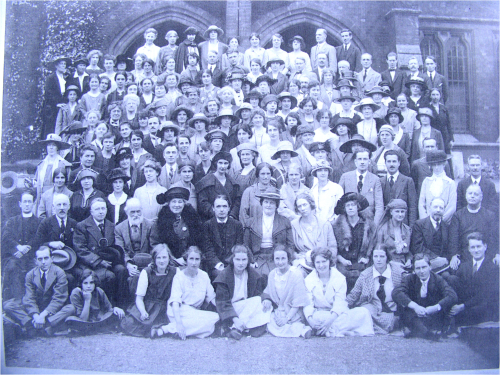
Almost the only photo I have been able to find of Miss Cross is in the group picture taken at the Oxford conference in 1922. Apart from Rudolf and Marie Steiner, there are some distinguished anthroposophists in the photo, including Edith Maryon, Eugen Kolisko, Harry Collison, Margaret McMillan, Millicent Mackenzie, Caroline von Heydebrand, Ilona Schubert, George Adams, Baron Arild Rosenkrantz, Juliet and Vera Compton-Burnett and several others. Miss Cross is at the top right of the picture, on the end of the 6thor 7throw, the small lady without a hat standing just below George Adams.
So as to help Miss Cross with the new direction for her school, a committee was formed to provide practical training support in Waldorf methods. A teacher was sent from Kings Langley to the Waldorf school in Stuttgart, with Miss Cross herself soon to follow. Steiner also sent to Kings Langley from the Goetheanum two English women (Juliet and Vera Compton-Burnett, sisters of the novelist Ivy Compton-Burnett) who had trained at Dornach. George Adams, who was Steiner’s translator whenever he was in England, was also a member of this committee. A little later, Adams, Miss Cross and the Compton-Burnetts were present at the Goetheanum to attend the lecture cycle on The Spiritual Communion of Man at New Year’s Eve on 1922, and thus they were present when the Goetheanum was burnt to the ground. The same group was also present at the 1923 Christmas conference, when Steiner gave the Foundation Stone Meditation – so these people took part in some of the seminal moments in anthroposophical history.
In December 1922, Rudolf Steiner sent a Christmas present to Margaret Cross. It was a verse, now known as the Kings Langley Grace:
As quicken the roots in the night of the earth,
As the leaves unfold through the power of the air,
As ripens the fruit in the might of the sun,
So quickens the soul in the shrine of the heart,
So unfolds man’s spirit in the Light of the World,
So ripens man’s strength in the glory of God.
And root and leaf and the ripe fruit’s blessing
Support the life of men on earth
And soul and spirit and the strong deed’s action
May raise themselves in gratitude to God.
But by August 1923, Miss Cross had somehow managed to fall out with most of her committee of helpers. Steiner wrote to Edith Maryon from Ilkley in Yorkshire, (where he was giving another course of educational lectures, presided over by the excellent Margaret McMillan) in which he said: “The committee once created to reorganise the Kings Langley School now consists only of Mrs Drury-Lavin; all the others have resigned. The plan of doing something with Miss Cross they consider hopeless. She herself is most distressed about it.”
The problem, it seems, was that Miss Cross could never quite reconcile herself to the idea of the school being run by a College of Teachers; and so it was that Michael Hall, formed in 1925 as the result of a request to Steiner at that Ilkley gathering, had the honour of being acknowledged as the first proper Waldorf school in the UK.
Miss Cross nevertheless persisted with her school along Waldorf lines, even after the death of her partner Hannah Clark in 1935. It must have been at that time that Miss Cross designed the grave and the bench, as a memorial for both Hannah Clark and her late father, Norman Cross. Both the grave and the bench bear powerful testimony to the creative and intellectual distinction of Margaret Cross. There are two name plaques on the grave, one with wording in memory of Hannah Clark, the other one is blank – perhaps Miss Cross had envisaged that the second plaque would be for herself – but I do not think that she was buried there, and I’ve not yet been able to find out where her remains now lie.
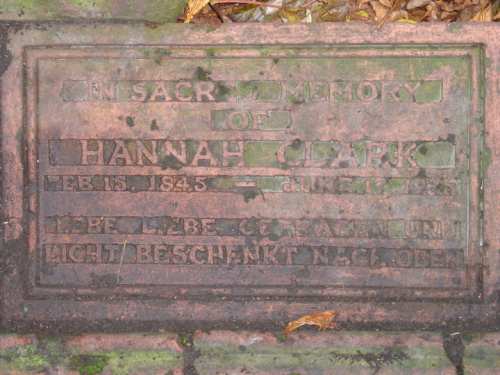 The wording on Hannah Clark’s plaque is:
The wording on Hannah Clark’s plaque is:
“In Sacred Memory of Hannah Clark
February 15th 1845 – June 17th 1935
Lebe Liebe getragen und
Licht beschenke nach Oben.”
Daniel Bryan tracked these German words down to a lecture by Steiner: Der Tod – Die Andere seite des Lebens (Death – the other side of life) and translated them as follows: “Live carried by love and Blessed by light ever upwards.”
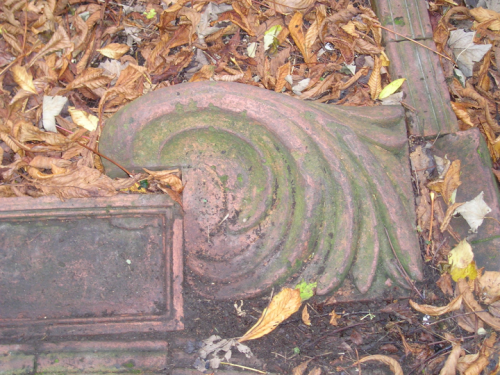

Both the grave, or what is left of its sculptural work, and the bench, which is still complete, are striking examples of the arts and crafts style. The beauty of the wings around the inscription seem to be the wings of love as described by the quotation from Steiner. The details of the cornerstones depict four crosses, a reference to the Christian symbol and the family name.
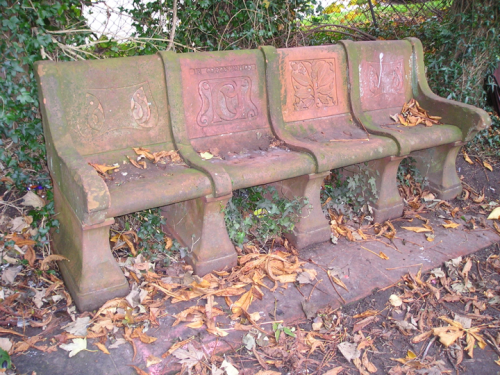
The backrest panels of the bench are of great interest as they appear to depict anthroposophically significant motifs: celestial lemniscates right and left, and on the right centre panel the tree of life, with a cocoon, a caterpillar, a butterfly and seedlings encompassed by a heart, all executed with great craftsmanship. My assumption is that all of this was designed by Margaret Cross.

After Hannah Clark’s death, Miss Cross continued to run the Priory School. Then in 1949, in apparent deep frustration at her unwillingness to change, almost all of her teachers broke away from her with the intention of starting a new school. This they did, buying two buildings right next door to her school, and taking with them most of Miss Cross’ pupils. This led to a court case against them, which was reported in great detail by the newspapers of the time. Miss Cross alleged that the teachers had formed themselves into an association in 1945 which had gradually sought to obtain the control of the school from her. She claimed a declaration of her right to the ownership of the school and certain furniture, and also sought an injunction to restrain the teachers from starting a similar school in the two houses adjoining her premises.
The judge trying the case was obviously intrigued and amused by everything he was hearing and said at one point: “Steiner seems to have told the teachers how to do everything except how to get on together without a row.” He gave judgment against the teachers, or “this very peculiar body” as he called it: “What conceivable right they had to sack the head mistress passes my comprehension. They took leave not only of their manners but also their senses. In this particular case the College of Teachers got its heads so far into the clouds that it forgot or omitted to keep its feet on solid earth.”
The Daily Express was also amused by the case, reporting that “Miss Margaret Frances Cross – ‘I am over 70, but I don’t see why I should make my age public’ – (she was actually about 83 years old at the time) arrived in Kings Langley last night and surveyed the school for which she had fought and won – the Rudolf Steiner School. One hundred yards away six teachers against whom she had gone to law were arriving back at Priory House, one of two hostels they own as an association.”
How very galling it must have been for Miss Cross that these teachers had set up their new school right next door to her school, had poached most of her pupils and left her with just two teachers. Likewise the teachers must have had their difficulties with Miss Cross, who was reluctant to have a College of Teachers, didn’t pay them well, probably kept them short of necessary resources and whose style of teaching they may have found impossibly old-fashioned.
So the New School, as they rather unimaginatively called it before the name was changed to Rudolf Steiner School Kings Langley, was founded as a result of disagreement and was located on a site which had seen a great deal of historical, spiritual and political turbulence. Have the energies of this place contributed to the present disastrous outcome, I wonder?
Miss Cross continued to run The Priory School with much diminished pupil numbers until 1955, and she died at the age of 96 in 1962.
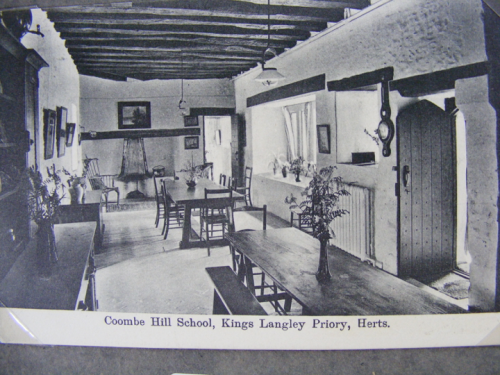
An interior at The Priory School, showing the simple, austere yet tasteful style adopted by Miss Cross and Miss Clark.
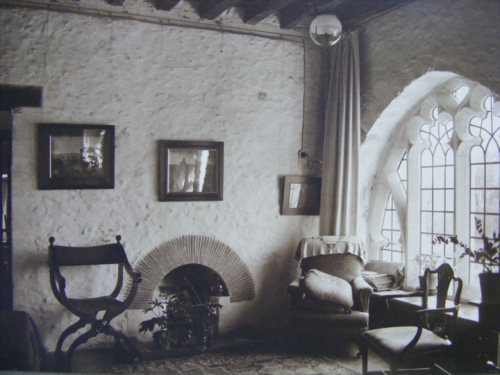
One end of the room in the old part of the Priory which Miss Cross called the Locutorium, where her visitors would be received.

A classroom in the old part of the Priory.
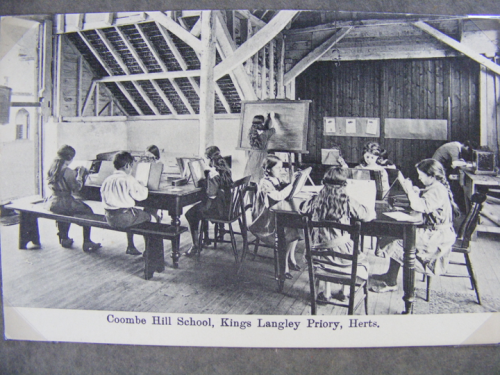
An art class in the Barn, one of the outbuildings at the Priory.
Although Miss Cross was an educationist of considerable standing, a highly educated and cultured woman, perhaps it could be said that in her school she wasn’t able to give expression to the full potential of Steiner Waldorf education. But she was also a pioneer of the Christian Community and one of the founders of anthroposophical agriculture in the UK, someone without whom the beginning of biodynamics in the UK could hardly have taken place. Carl Mier published some “Recollections of Margaret Cross” in the autumn 1962 issue of Star and Furrow:
“When I met Miss Cross first, she already gave the impression of an old person, old in the sense of ageless, and she hardly seemed to grow any older in the succeeding years. She was of small stature, bent, with a wrinkled face, but sparkling eyes. Her fingers were gnarled, her feet were encased in heavy shoes. One never met her but in heavy tweeds, carrying a large bag with papers and books. She lived in surroundings which seemed most befitting to her: a largish holding with many trees and bushes and shrubs, which gave at first sight the impression of neglect, until one discovered that more care was bestowed on it all than one thought. In the centre, the buildings of an old Dominican priory, modernised rather cleverly earlier this century, with farm buildings around. There was the same air of austerity in the house as one encountered in Miss Cross herself: an austerity in body-comforts, in meals, in light and warmth. And yet, it all had style. House and owner belonged together. When one opened the old-fashioned latch of her front door a spotlessly clean room greeted one, with that polish and almost loving austerity one meets in monasteries and convents. The bread she offered was home-made, the vegetables and fruit came from her own garden. All was simple, but all was the expression of Miss Cross.
She was one of the most learned and truly educated people I have ever had the privilege to meet. Her knowledge of English language and literature was profound, and alive. She was a classical scholar. And at my very last meeting with her – a few years before her death – I had a real surprise. She had broken her leg, and I asked whether I might see her to discuss a difficult matter over which in the past we had never quite come to an agreement. I was shown into her bedroom – furnished like a cell. There she was, undaunted by her age and her broken leg. She looked healthier than I had ever seen her before (it was probably the first time for years that she was warm and rested and properly nursed). She was in the most amiable mood, and our problem was settled within minutes. During a most animated conversation which made me forget her almost 90 years, I looked at the pile of books on her bed and bedside table. Next to a few books by Rudolf Steiner there was a whole collection of volumes on very advanced higher mathematics. ‘At last I have a chance of reading something about this. I have wanted to do so for a long time!’ Her eyes sparkled, and with her gnarled fingers which could hardly move she showed me some passages which had ‘thrilled’ her.
I think Miss Cross was a lonely person longing to do what this life had made difficult for her to accomplish. She was so strong a personality that co-operation with others did not come easily to her, and thus one missed in her school, for instance, that ‘College of Teachers’ which is an integral part of a Rudolf Steiner School. But she loved children so much that she taught almost to the end of her life.”
What Margaret Cross and the other teachers who worked so hard to establish Waldorf education at Kings Langley, and who are now in the spiritual world – I’m thinking of people like Nat, Philip and Moana Bowron, the Compton-Burnetts, John Wells, Heather Thomas – must be making of the present debacle, I can scarcely imagine. I shall be contributing my own thoughts on this death of a Steiner school in a future post.

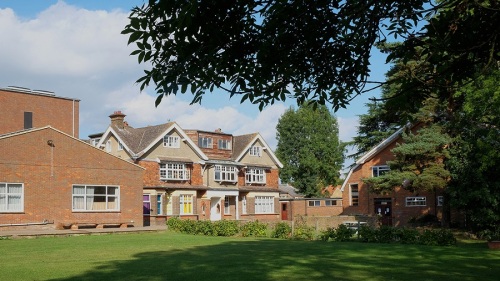










 The wording on Hannah Clark’s plaque is:
The wording on Hannah Clark’s plaque is:






